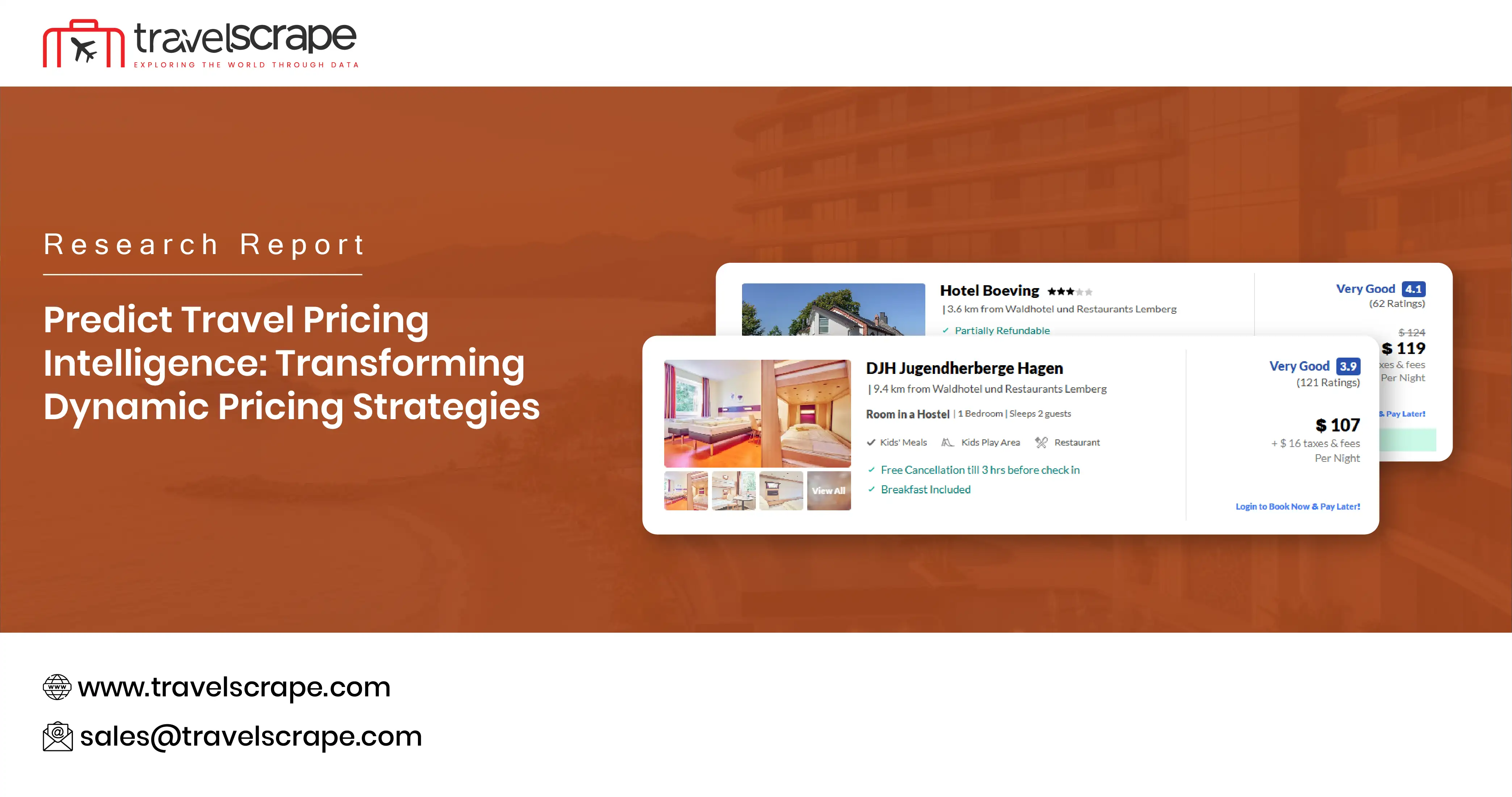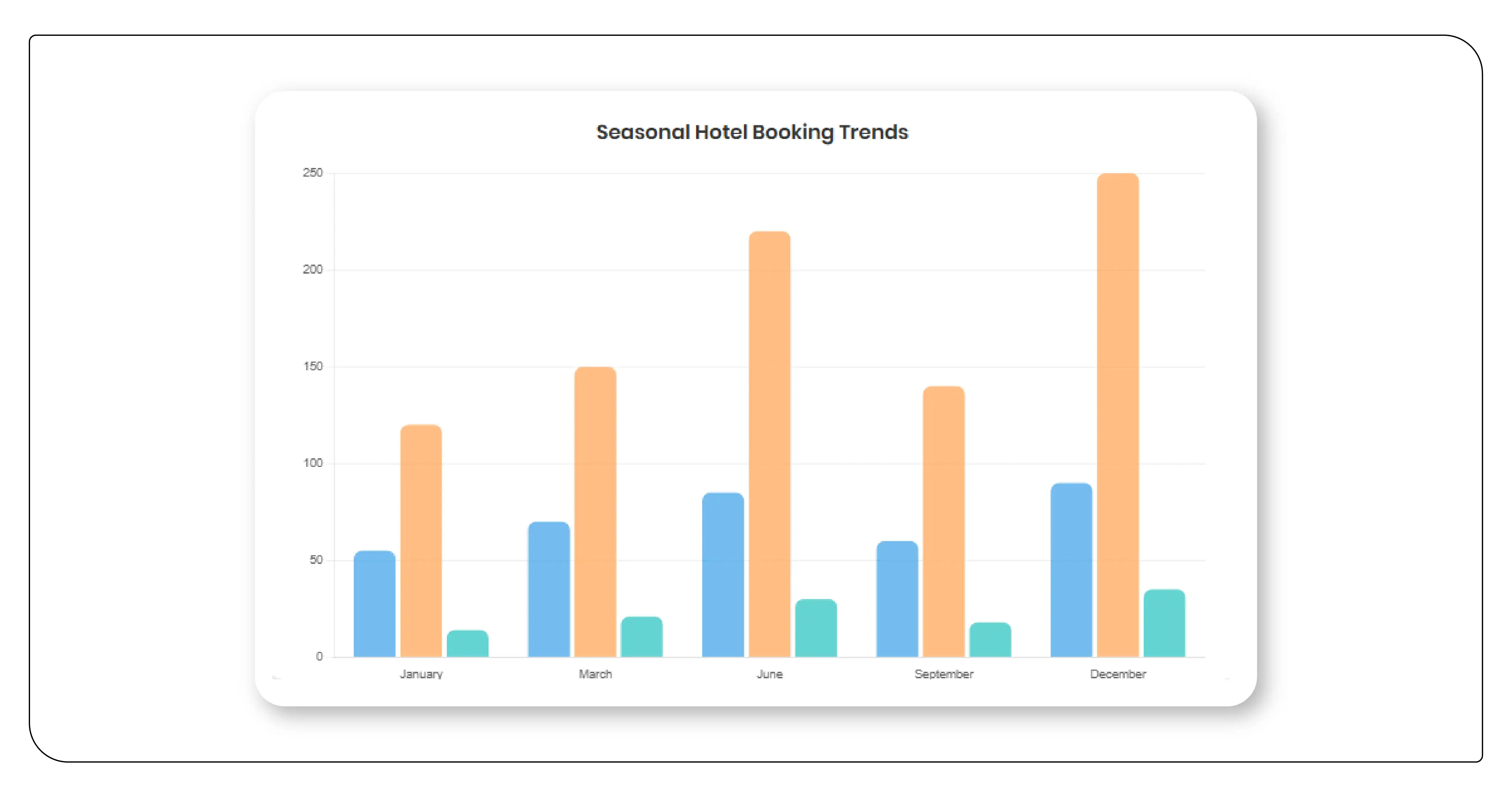Predict Travel Pricing Intelligence: Transforming Dynamic Pricing Strategies

Introduction
In today’s competitive travel and hospitality landscape, pricing strategies are more than just numbers—they are dynamic, data-driven decisions. Leveraging predict Travel Pricing Intelligence, businesses can analyze historical booking patterns and market signals to optimize pricing strategies across hotels, cabanas, and other accommodations. With fluctuating demand influenced by seasons, events, and consumer preferences, understanding these patterns is crucial for maximizing revenue while maintaining customer satisfaction.
The emergence of Travel Data Intelligence Solutions has empowered businesses to integrate large datasets from booking engines, review sites, and travel aggregators to generate actionable insights. By combining historical and real-time data, organizations can dynamically adjust rates to respond to changing market conditions. This approach ensures optimal pricing that reflects both supply and demand while maintaining competitiveness in a saturated marketplace.
Moreover, Web Scraping for Travel Revenue Intelligence enables hotels and travel agencies to collect structured data from multiple online sources efficiently. This collected data, combined with advanced analytics, allows stakeholders to monitor competitor pricing, seasonal demand spikes, and customer preferences in near real-time. By tapping into such comprehensive datasets, businesses can forecast pricing trends and respond proactively rather than reactively.
Understanding Seasonal Demand Patterns

A key component of dynamic pricing in the travel industry is the analysis of seasonal trends. Hotels, resorts, and other accommodations experience significant fluctuations in demand due to holidays, festivals, and vacation periods. These fluctuations can be leveraged to predict price elasticity, enabling operators to adjust rates dynamically.
For example, peak seasons like summer holidays or winter ski periods often see high booking volumes, warranting higher pricing. Conversely, off-peak seasons may require strategic discounts to attract more guests. The integration of Travel & Tourism Datasets allows analysts to quantify these seasonal variations and develop a Seasonal Travel Pricing Prediction Model tailored to each property type.
Table 1: Example of Seasonal Hotel Booking Trends
| Month | Average Occupancy (%) | Average Daily Rate ($) | Booking Lead Time (Days) |
|---|---|---|---|
| January | 55 | 120 | 14 |
| March | 70 | 150 | 21 |
| June | 85 | 220 | 30 |
| September | 60 | 140 | 18 |
| December | 90 | 250 | 35 |
This table demonstrates how demand varies across months. Hotels can use this information to optimize room rates and anticipate demand surges, aligning with a Travel Review Data Intelligence strategy that also incorporates customer feedback for additional insight.
AI-Powered Forecasting and Dynamic Adjustments
Artificial intelligence (AI) is revolutionizing pricing strategies in the travel industry. AI algorithms analyze historical booking data, competitor prices, and consumer behavior to generate predictive models for rate optimization. Incorporating method to Extract Hotel Demand and Booking Pattern Data Scraping, AI models can identify trends that human analysts might overlook.
Machine learning models, for instance, can forecast expected occupancy rates and recommend adjustments in real-time, considering factors such as last-minute cancellations, local events, and competitor promotions. Scraping Seasonal Travel Trend Reports framework ensures that businesses remain agile, responding promptly to dynamic market conditions.
Table 2: AI-Based Dynamic Price Recommendations
| Day Type | Base Rate ($) | AI Recommended Rate ($) | Occupancy Forecast (%) | Notes |
|---|---|---|---|---|
| Weekday | 150 | 145 | 65 | Moderate demand |
| Weekend | 180 | 210 | 90 | High demand due to local festival |
| Holiday | 200 | 240 | 95 | Peak season, limited room availability |
| Off-Peak | 120 | 110 | 50 | Low demand, apply promotional discount |
This table illustrates how AI-driven recommendations allow hotels to adjust rates dynamically, ensuring maximum revenue and optimal occupancy levels.
Integrating Multiple Data Sources
Dynamic pricing requires comprehensive data collection. Using Hotel Data Intelligence methods, businesses aggregate information from booking platforms, online travel agencies, customer reviews, and historical occupancy records. Such multi-source data integration facilitates a holistic understanding of market dynamics, enabling better-informed pricing decisions.
Web scraping plays a critical role in this ecosystem. By employing Web Scraping for Travel Revenue Intelligence, businesses can extract competitor pricing, promotions, and package offerings. This data can then be combined with internal datasets to identify pricing gaps and opportunities for revenue enhancement.
Benefits of Dynamic Pricing in Travel
- Revenue Maximization: Real-time adjustment of rates ensures optimal revenue capture across varying demand levels.
- Enhanced Competitiveness: Monitoring competitors through scraped data allows for strategic pricing to maintain market share.
- Customer Satisfaction: Tailored pricing for peak and off-peak periods aligns supply with demand, improving booking experiences.
- Predictive Insights: AI models leverage historical data to predict occupancy and pricing trends, reducing guesswork.
- Operational Efficiency: Automation reduces manual pricing efforts, allowing staff to focus on customer service and strategic initiatives.
Case Study: Hotel Chain Revenue Optimization
Consider a mid-sized hotel chain implementing AI-driven dynamic pricing. By integrating Travel & Tourism Datasets, the chain was able to forecast booking patterns three months in advance. The insights from Travel Review Data Intelligence further refined pricing, ensuring rates matched customer expectations while maximizing revenue. Over a six-month period, the chain observed a 12% increase in total revenue and a 15% increase in occupancy during traditionally low-demand months.
This case highlights the power of combining data scraping, AI forecasting, and pricing intelligence to make actionable decisions.
Future Trends in Travel Pricing Intelligence

Dynamic pricing is evolving beyond traditional models. Emerging trends include:
- Real-Time Market Adaptation: Continuous monitoring of competitors and consumer behavior for instant rate adjustments.
- Personalized Pricing: Leveraging customer profiles and loyalty programs to offer individualized pricing strategies.
- Integration with Marketing Strategies: Aligning promotions and pricing decisions with digital marketing campaigns to maximize impact.
These trends will further enhance the capabilities of Hotel Data Intelligence, enabling proactive pricing strategies and improved customer experience.
Conclusion
The integration of dynamic pricing strategies with AI, historical data analysis, and multi-source datasets is transforming the travel and hospitality industry. By leveraging Historical Hotel Room Booking Pattern Analysis, businesses can anticipate demand fluctuations and adjust rates dynamically.
Hotels can also Scrape Historical Travel Pricing Data for Insights to understand past pricing trends and refine their pricing strategies.
Access to Hotel Room Price Trends Dataset allows operators to identify optimal pricing points and enhance revenue. As the industry evolves, adopting comprehensive data collection and AI forecasting will be essential for hotels, resorts, and travel agencies. Real-time intelligence tools further enable businesses to maintain competitiveness in an increasingly data-driven market while achieving sustained growth and profitability.
Ready to elevate your travel business with cutting-edge data insights? Scrape Aggregated Flight Fares to identify competitive rates and optimize your revenue strategies efficiently. Discover emerging opportunities with tools to Extract Travel Website Data, leveraging comprehensive data to forecast market shifts and enhance your service offerings. Real-Time Travel App Data Scraping Services helps stay ahead of competitors, gaining instant insights into bookings, promotions, and customer behavior across multiple platforms. Get in touch with Travel Scrape today to explore how our end-to-end data solutions can uncover new revenue streams, enhance your offerings, and strengthen your competitive edge in the travel market.